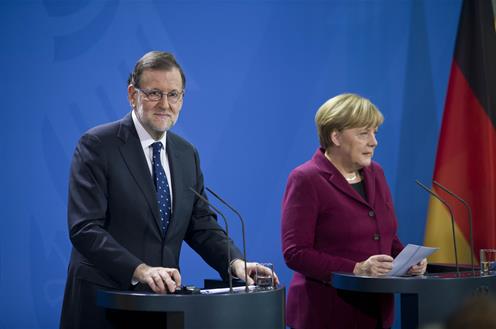Following the bilateral meeting held in Berlin with the German Chancellor, Angela Merkel, the President of the Government, Mariano Rajoy, underlined the unquestionable commitment of both countries to Europe. Mariano Rajoy also invited Angela Merkel to visit Spain in the first quarter of 2017.
At the joint press conference offered at the end of the meeting, Mariano Rajoy highlighted the “wonderful state” of relations between Spain and Germany, a country with which “we have shared many experiences and overcome many difficulties”. For her part, Angela Merkel stressed the importance of trade relations with Spain and the “very positive path” this is taking.
The President of the Government declared that the two governments will continue to work with determination to make strides on the European project. “We will give this special importance and prioritise the real problems facing our citizens and continue defending such values as tolerance, solidarity and the ideals that have made Europe a benchmark for peace and progress throughout the world”.
Meeting between European leaders and United States
Mariano Rajoy thanked Chancellor Merkel for organising the meeting held in Berlin with five great partners and allies of our country, the Heads of State and Government of Germany, Angela Merkel; of France, François Hollande; of Great Britain, Theresa May; of Italy, Matteo Renzi; and of the United States, Barack Obama, at which they all observed “the overarching relevance” placed on Transatlantic relations.
The President of the Government explained that, at this meeting, which preceded his bilateral meeting with Angela Merkel, various issues of international politics were tackled, such as the fight against DAESH, the situation in Ukraine, relations with Russia and the migratory and refugee crises.
As regards Syria, the six leaders expressed their deep concerns over the humanitarian crisis, particularly in Aleppo. “We reiterate the need for a lasting ceasefire that guarantees unrestricted humanitarian access and allows negotiations to be resumed in order to reach a political solution under the auspices of the United Nations”, said Mariano Rajoy.
In relation to Iraq, the European leaders and the President of the United States analysed the progress made in the offensive on Mosul. Mariano Rajoy pointed out that “we must be prepared for the post-conflict scenario, stabilisation and the subsequent rebuilding of the city to allow the safe return of those who were displaced”.
As regards Libya, Mariano Rajoy claimed that everyone agrees on the need to step up their support for the Government of National Accord and for the efforts of the Special Representative of the United Nations.
In relation to Ukraine, the leaders reiterated their rejection of the illegal annexing of Crimea. “We have underlined the need to comply with the Minsk Accords, including a genuine ceasefire and for elections to be held in certain parts of Donetsk and Luhansk in accordance with the requirements imposed by the OSCE”, stated the President of the Government.
Refugee crisis
Upon a request from the German Chancellor at the meeting of Heads of State and Government, Mariano Rajoy gave an introductory speech on the issues of asylum and immigration.
The President of the Government outlined Spain’s experience with West African countries. Moreover, he maintained that “it is key” to reach understandings and agreements with these countries, establish legal channels for emigration and cooperate with them so that they gradually improve their standard of living with the aim of “their citizens not feeling forced to risks their lives by leaving their country”.
Future of the European project
When asked about Germany’s role in the European project given the present international backdrop, the President of the Government underlined the importance of the stability of this country, which has the largest Gross Domestic Product, population and per capita income in the EU and is the largest exporter. Mariano Rajoy added that it would also be desirable to see “a core group of countries” in Europe moving in this same direction.
In his opinion, one of the most serious problems the continent has suffered from in recent years is the proliferation of “sui generis” political forces that have generated “negative press” for its citizens. “We hope that this will be corrected and I trust that, although next year will be difficult from an electoral point of view in Europe, things will start to get back on track”, he declared.
As regards cooperation on security and defence matters, the President of the Spanish Government declared himself to be in favour of stepping them up between all the members of the EU, “which is absolutely compatible with our membership of NATO”. He also highlighted that, in regard to NATO, Spain has certain budgetary commitments “that it is our intention to meet”.
Current affairs
In relation to the General State Budget for 2017, Mariano Rajoy explained that firstly the government will present the ceiling on spending and the budget stability targets for next year to Parliament, which will allow the regional governments and local authorities to draw up their own accounts. The President of the Government reiterated his willingness to speak with other political forces with a view to the Budget being approved.
As regards the public deficit, he claimed that this year it will end up standing at 4.6% of GDP and that the government “intends” to meet the target set by the European Commission for 2017 of 3.1%. “We want to do this, firstly, because that is our commitment to the European Union and, secondly, because thanks to the reforms and to the deficit reduction, and thanks to the confidence and credibility this gave our country, we are currently growing more than any other country in Europe and creating jobs”, he argued.
http://www.lamoncloa.gob.es/lang/en/Paginas/index.aspx





